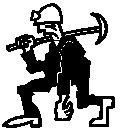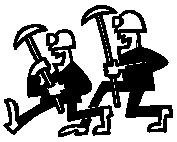
pressure
The real creative ideas originate hither and yon in the individual members of the staff and
no one can tell in advance what they will be or where they will crop up.
Frank B. Jewett ( first head of Bell Labs
Pressure often is needed to make us do things and therefore is often confused with motivation. Some of us will only be motivated to work hard or do something about it when the pressure is high enough. There are two kinds of pressure: from within (intrinsic motivation) and from without (also compare trees). One sometimes hears people say that they can only work well when they have to meet a deadline. This shows that it is especially the pressure from the outside that motivates them. If you are interested in creativity it is wise to find out where you get most of your 'motivation'. Motivation is the inner urge to do something; a lust for life. It gives us the power to act. When a task is completed and we feel tired but satisfied we have new energy. The human animal's behaviour is determined by unsatisfied needs (Maslow). Every individual
- has primary needs such as food and drink;
- wants safety (clothing, shelter);
- wants to identify with a certain group (status of peer group)
- wants to satisfy his ego (improve);
- wants to develop (compare past performance with present performance);
- aims to fulfill itself (self-actualization).
Each level is based on the foregoing, when we have nothing to eat, we are only motivated by food. Maslow's hierarchy suggests that if the individual has his physiological needs satisfied, together with his need for safety from aggressors, he then becomes chiefly concerned with being accepted by his family and the social group. Once accepted, he will next concern himself with ego needs such as being well thought of in their eyes so that he may come to think well of himself. Having satisfied these ego needs, he then moves on to autonomy, that is to a sense of independence and personal freedom, and finally to self-actualization. This is a more difficult concept but one upon which Maslow lays great stress. Self-actualization means in effect that the individual develops those characteristics peculiar to mature and well-adjusted people. He becomes, for example, realistic, independent, creative, problem-centered rather than self-centered and with a ready appreciation both of other people and of the world about him.
Of course, although we are each faced with this same hierarchy, some of us will climb higher in our life-time than will others. We will also tend to tackle the problems associated with it in different ways. These differences are evidenced by the way we express our successes and failures. Extravert people tend to ascribe these things to factors outside themselves (e.g. 'I did well because I had the lucky breaks.', 'I failed because my teacher was no good.') Introverts feel the responsibility usually lies within themselves (e.g. 'I made it because I worked hard.' 'I failed because I didn't take it seriously enough.')
On this internal hierarchy of needs Douglas McGregor has developed two motivational theories:

Theory X which described people living on the following assumptions:
- People hate work.
- They will only work wen they are rewarded or punished.
- They only like security, are not ambitious, take no initiative and don't like responsibility.
If you find this hard to swallow, just look around you. At school faults are counted and marks should motivate. In many companies that you are there is more important than why you are there. Suggestions for improvement are often brushed aside as 'things have been done like this for so many years'. It would seem that many of us just perform to avoid nasty consequences. Creativity is usually not stimulated but regarded with suspicion (cf. Monohops). Many people have to take more important decisions on their way to work in their cars than on the job. All pressure according to this vision should be from the outside. And the catch is that if I regard and interact with people in that manner they will also seem to react in that manner! (cf. patterns under change)
According to theory Y
- work is as natural as rest or play;
- people need not be forced or punished,
when they have committed themselves, they will work harder than when they are forced.
However, they will only commit themselves insofar as they see the possibility to satisfy there ego and development needs.

Creativity cannot be enforced it must needs come from the inner need to develop. As Winnicott said 'creative apperception' i.e. self-consciousness makes life worth living. When the 'self' is compared to a room, motivation is like a door which can only be opened from the inside. This is most clearly seen with children. No one needs to force the child to learn things, it only needs an inviting environment, the higher the pressure the less likely it is to learn.
When I regard life with an 'X-vision' I create dependence. Dependence on the outside to pressurize me to do things, which I would never do if I had not been told. It will also stimulate me to find the loopholes (a kind of negatively oriented creativity) not to be caught while doing the minimum.
In a culture with abundant rules this is certainly stimulated. Creative self-consciousness on the other hand wants to create independence, which is based on respect of the self and others.
Creative techniques should therefore never be forced onto others. They should be used with caution and adapted to the particular situation. They are no panacea but tools which are best used in accordance with their purpose. Otherwise it will be like the man who does all the odd jobs in the house with a hammer, since this is the only tool he has.
creativity > creating independence by developing respect